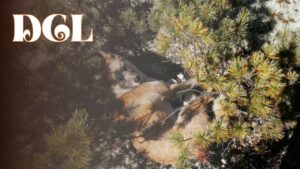In this article, I will explore the question: ‘Are pine trees toxic to dogs?’
As a dog owner, I understand the importance of keeping our furry friends safe from potential hazards.
Pine trees are a common sight in many households, but it is essential to be aware of any risks they may pose to our canine companions.
By understanding the potential dangers and taking preventive measures, we can ensure our dogs’ well-being and create a safe environment for them to thrive in.
Potential Hazards of Pine Trees for Dogs
Pine trees can be toxic to dogs, so you should be cautious when your furry friend is around them. While pine trees are a beautiful addition to any landscape, they can pose potential hazards to our canine companions.
One of the main concerns is the ingestion of pine needles. These needles can cause irritation and damage to a dog’s digestive system, leading to vomiting, diarrhea, and abdominal pain. In some cases, the needles can even cause blockages, requiring surgical intervention.
Another hazard to be aware of is the sap produced by pine trees. This sticky substance can irritate a dog’s skin and cause allergic reactions. If your dog comes into contact with pine sap, it is important to wash the affected area thoroughly to remove any residue. Additionally, some pine trees produce pine cones, which can be a choking hazard if ingested by a dog.
It is also worth mentioning that certain pine tree species, such as the Norfolk Island Pine, can be even more toxic to dogs. Ingesting the needles or bark of these trees can cause more severe symptoms, including tremors, seizures, and even organ failure.
To ensure your dog’s safety, it is best to keep them away from pine trees altogether. If you have pine trees in your yard, consider fencing off the area or using barriers to prevent your dog from accessing them. Regularly inspect your yard for any fallen pine needles or cones and promptly remove them.
By being cautious and proactive, you can keep your furry friend safe from the potential hazards of pine trees.

Symptoms of Pine Tree Toxicity in Dogs
If your furry friend is exposed to a pine tree, you may notice certain symptoms indicating potential toxicity. It’s important to be aware of these signs so you can take appropriate action and seek veterinary care if necessary. The table below provides a visual representation of the common symptoms of pine tree toxicity in dogs.
| Symptoms | Description |
|---|---|
| Vomiting | Dogs may vomit after ingesting pine needles or other parts of the tree. |
| Diarrhea | Digestive upset, such as diarrhea, can occur as a result of pine tree ingestion. |
| Lethargy | Dogs may appear tired or sluggish if they have been exposed to toxic substances in the pine tree. |
It’s important to note that these symptoms can vary in severity depending on the amount of pine tree ingested and the individual dog’s sensitivity. If you notice any of these signs in your pet after exposure to a pine tree, it’s best to consult with your veterinarian for guidance. They will be able to evaluate your dog’s condition and recommend appropriate treatment. Remember, prevention is key, so it’s important to keep an eye on your dog and discourage them from chewing or ingesting pine trees.
Preventive Measures for Keeping Dogs Safe
To ensure the safety of your furry companion, it’s crucial to take preventive measures. When it comes to keeping dogs safe from pine tree toxicity, there are a few things you can do.
Firstly, make sure to keep your dog away from any pine trees or areas where pine needles are present. This can be done by creating a physical barrier, such as a fence or gate, to prevent your dog from accessing these areas.
Additionally, it’s important to keep your dog on a leash during walks, especially if you know there are pine trees in the vicinity. This will allow you to have better control over your dog and prevent them from coming into contact with any potentially toxic parts of the tree.
Furthermore, regularly inspect your yard and remove any fallen pine needles or debris. This will help minimize the risk of your dog ingesting any harmful substances.
Lastly, if you suspect that your dog has ingested any part of a pine tree, it’s important to seek immediate veterinary attention. Remember, prevention is key when it comes to keeping your furry friend safe from pine tree toxicity.
What to Do If Your Dog Ingests Pine Tree Materials
In the event that your furry companion consumes materials from a pine tree, it’s crucial to seek immediate veterinary attention. Pine trees can be toxic to dogs, and ingesting any part of the tree, such as needles, bark, or sap, can cause a range of health issues.
If you suspect that your dog has ingested pine tree materials, it’s important not to panic but act swiftly. First, try to gather any information about the type of pine tree your dog encountered. This will help your veterinarian determine the potential toxicity level.
Next, contact your vet and describe the situation in detail. They may ask you to bring your dog in for an examination or provide specific instructions based on the symptoms your dog is experiencing.
While waiting for veterinary advice, closely monitor your dog for any signs of distress. Symptoms of pine tree ingestion can vary and may include vomiting, diarrhea, lethargy, difficulty breathing, or even seizures. It’s important not to induce vomiting or administer any home remedies without professional guidance, as this could worsen the situation.
Remember, time is of the essence when dealing with potential pine tree toxicity. By seeking immediate veterinary attention, you can ensure your dog receives the necessary care and treatment to recover from any adverse effects.
Alternatives to Pine Trees for Dog Owners
Consider other types of trees or plants that are safe for your furry friend, such as cedar or spruce, as alternatives for creating a dog-friendly environment in your yard. These trees not only provide shade and beauty but also pose no harm to your precious pup. To help you make an informed decision, here’s a comparison between pine, cedar, and spruce trees in terms of their characteristics and benefits for dogs:
| Tree Type | Characteristics | Benefits for Dogs |
|---|---|---|
| Pine | Soft needles, strong scent | None, can be toxic |
| Cedar | Soft needles, pleasant scent | Natural pest repellent |
| Spruce | Short, stiff needles | Durable branches for climbing |
As you can see, pine trees should be avoided due to their potential toxicity to dogs. Cedar trees, on the other hand, not only have soft needles that won’t harm your dog’s paws but also emit a pleasant scent. Additionally, cedar acts as a natural pest repellent, which can help keep fleas and ticks away from your furry friend. Spruce trees are another great alternative, with short and stiff needles that are less likely to shed and cause irritation. Plus, their durable branches can provide a fun climbing experience for your dog. So, when it comes to creating a dog-friendly yard, consider these safe alternatives to pine trees. Your furry friend will thank you!

Frequently Asked Questions
Can dogs develop long-term health issues from being around pine trees?
Dogs can develop long-term health issues from being around pine trees. The sap and needles can cause irritation to their skin and digestive system. It’s important to prevent exposure to protect their health.
Is it safe for dogs to chew on pine cones?
It is generally safe for dogs to chew on pine cones as long as they are not treated with any chemicals. However, it is still important to monitor them to prevent any choking or digestive issues.
Are all varieties of pine trees equally toxic to dogs?
All varieties of pine trees are not equally toxic to dogs. Some pine trees, such as the ponderosa pine, have higher levels of toxins that can be harmful to dogs if ingested, while others may be less toxic or non-toxic.
Can the sap or resin from pine trees be harmful to dogs?
Yes, the sap or resin from pine trees can be harmful to dogs. It may cause gastrointestinal upset, skin irritation, or even allergic reactions. It’s best to keep dogs away from pine sap to prevent any potential health issues.
Are there any natural remedies or treatments for pine tree toxicity in dogs?
There are no known natural remedies or treatments specifically for pine tree toxicity in dogs. If your dog ingests any part of a pine tree, it is important to seek immediate veterinary care.
Conclusion
In conclusion, I’ve learned that pine trees can be toxic to dogs. This poses potential hazards if ingested. It’s important for dog owners to be aware of the symptoms of pine tree toxicity and take preventive measures to keep their pets safe.
If your dog does ingest pine tree materials, it’s crucial to seek immediate veterinary assistance. As an alternative, dog owners can consider planting non-toxic trees or creating a safe environment for their furry friends.
Stay informed and keep your dogs protected!


